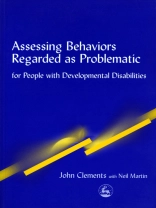People with developmental disabilities sometimes behave in ways that others, or they themselves, regard as problematic. This original book is about what practitioners can do to make sense of behaviors, in order to support clients more effectively.
The author offers practical strategies for gathering and analysing information about behaviors, in partnership with the individual concerned, in order to gain a useful understanding of why a particular behavior occurs. The inclusion of case histories, with corresponding behavior plans, clearly demonstrates the real-life application of assessment methods.
With its strong emphasis on the importance of establishing equitable, respectful relationships between professionals and people with learning disabilities, this is a book that professionals involved in the lives of people with developmental disabilities will find invaluable.
Innehållsförteckning
Preface. 1. Establishing the assessment agenda. 2. Relationships in assessment: The empathy mode. 3. Relationships in assessment: The analytic mode. 4. The tool box, John Clements and Neil Martin. 5. Extracting meaning from the information gathered. 6. The Behavioural Explorer Assessment System, John Clements and Neil Martin. 7. The stories we can tell. 8. Organizing the practice. 9. Last words. Appendix 1: Behaviour recording charts. Appendix 2: Clements Rapid Assessment Protocol. Resources. Index
Om författaren
John Clements is a clinical psychologist of over forty years’ standing, specializing in the field of developmental disabilities. He has previously worked for the NHS and university system in the UK and jointly established the UK’s first independent psychology practice specializing in issues for people with developmental disabilities. He has also worked as a behavior consultant in California, taking a particular interest in helping people with autism and their families.












